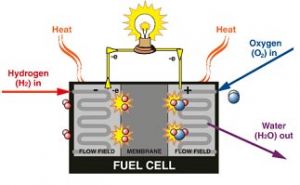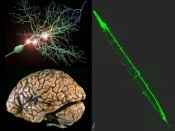Research Highlights
Contribution to understanding the mechanisms underlying memory formation and coding in the brain via the use of computational models
Work in the Computational Biology Laboratory of IMBB-FORTH, which is headed by Dr. Panayiota Poirazi, has used computational models to show that a single neuronal cell in the brain is capable of detecting spatiotemporal differences of incoming signals and encoding them into its response pattern.
Opening of the first worldwide exhibition of interactive systems
The first worldwide exhibition of interactive systems dedicated to ancient Macedonia, developed in cooperation by the Archaeological Museum of Thessaloniki (AMTH) and the Institute of Computer Science, Foundation for Research & Technology-Hellas (ICS-FORTH), opens the doors on Monday, 1st November 2010 at AMTH.
Contribution of FORTH/ICE-HT to the groundbreaking discovery of Graphene - the perfect atomic lattice
The close collaboration of FORTH/ICE-HT with the 2010 Nobel Prize Laureates in Physics is another example of the forefront scientific research conducted at the Institute in the field of nanomaterials and their applications.
A significant success for FORTH: Four RTD proposals in the field of fuel cells and hydrogen production have recently been selected for funding by the European Commission
The Institute of Chemical Engineering and High Temperature Chemical Processes of the Foundation of Research and Technology-Hellas (FORTH/ICE-HT) has recently received a new distinction at European level, as the European Committee selected for funding four (4) proposals in the field of fuel cells and hydrogen production. This is a field in which a large group of FORTH/ICE-HT researchers focuses its efforts.
How proteins find their way out of cells, an essential mechanism for cellular function
The Institute of Molecular Biology and Biotechnology (IMBB) of FORTH participates in the effort to understand a fundamental biological problem, namely how cells regulate trafficking of their proteins. Some of the research results are presented in today's edition of Nature, one of the most authoritative international scientific journals. They stem from intercontinental cooperation between the research teams Tassos Economou, IMBB Researcher and Associate Professor at the Biology Department of the University of Crete and that of Charalambos Kalodimou, Associate Professor at Rutgers University (New Jersey, USA).
A significant success for FORTH:
The research project ADAPTIVES has recently been selected for granting by the European Research Council (ERC) Starting Fund 2009
FORTH has recently received a new distinction at European level, as the project "ADAPTIVES/ Algorithmic Development and Analysis of Pioneer Techniques for Imaging with waVES" submitted by Dr. Chrysoula Tsogka has been selected for granting by the European Research Council (ERC) Starting Fund 2009.
IMBB researchers reveal a novel mechanism regulating metabolism and ageing
Research at the Institute of Molecular Biology and Biotechnology, published today in the international scientific journal Nature, reveals a novel molecular mechanism that regulates cellular metabolism and ageing.
IMBB - FORTH researchers reveal a novel mechanism of mitochondria biogenesis
Research at the Institute of Molecular Biology and Biotechnology, published in the international scientific journal Nature Structural and Molecular Biology, revealed a novel molecular mechanism that modulates mitochondria biogenesis.
IMBB researchers uncover a novel mechanism, important for learning and memory
Research at the Institute of Molecular Biology and Biotechnology, published today in the international scientific periodical EMBO Journal, reveals an important molecular mechanism that facilitates learning and the formation of memories by the nervous system.
NeuronAge research earns Tavernarakis an ERC Advanced Investigator Grant
Nektarios Tavernarakis, a researcher at the Foundation for Research and Technology - Hellas (FORTH), has recently been awarded the prestigious European Research Council (ERC) Advanced Investigator Grant for his research proposal titled "Molecular Basis of Neuronal Ageing - NeuronAge."
Page:1 .... 111213141516 | < Prev Next >

















